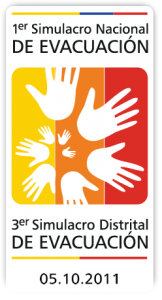On the morning of October 5, 2011, Colombia carried out a national evacuation simulation exercise [1] [es], in which 14 cities participated. The idea was to simulate an emergency (an earthquake) and build awareness of the steps people should assume in the event of an actual emergency.
Those in charge of the event, which was scheduled by the national government to start at 11:00am, turned to the media and a website [2] [es] to invite Colombians to take part in the exercise. As such, state institutions, educational establishments and a number of private companies agreed to participate in this simulation, which was the first on a national level, but the third in the city capital, Bogotá [3] [es].
The event's official site published [5] [es]:
El Simulacro de Evacuación ha permitido posicionar a Bogotá y al país en general como líderes en el tema de prevención y preparación para afrontar emergencias en América Latina. Este año se ha hecho especial énfasis en el sector educativo, en el cual ya confirmaron su participación 214 planteles educativos, tanto privados como públicos, de toda la ciudad.
Social networks did their part and people spoke about the event with quite a sense of humor.
Some also placed a political spin on it. Carlos Hernánez (@creacionhumana [6]) [es] said that it was a smokescreen so that people would not discuss the passage of the Free Trade Agreement between the United States and Colombia:
Lo del #simulacro [7] era para distraernos de la aprobación del TLC?
Mal_nacida (@JelizMon [8]) [es] took advantage of the situation and spoke about the flaws in the Colombian health system's attention to emergencies:
Por que no mejor un #simulacro [7] de atender bien en las URGENCIAS de los hospitales
Nonetheless, Twitter users like Marisol Gutierrez (@marysolga [9]) [es] made light of the event and wrote:
charlé, reí, caminé, busqué a mi grupo, dije presente y volví a trabajar, estaba #simulacro [7]. Jaja será que en un terremoto se pasa tan bueno?
There were also varying opinions that demonstrated the fact that the objective of the event was not reached.
José David Hidalgo (@josedavidalejo [10]) [es] wrote:
El #Simulacro [11] De Mi Colegio Fue Muy Malooo :/
Geovanna Valencia (@Geovannella [12]) [es] pointed out that during a real emergency, no one stays calm:
#simulacro es una perdedera de tiempo, a la hora de una emergencia NADIE piensa, ni conserva la calma!
Finally some, like Sebastián Álvarez (@SebasAlvarez6 [13]) [es], didn't notice a simulation was going on:
Yo ni me di cuenta del #simulacro [7]!
You can read more reactions under the hashtag #simulacro [14].
